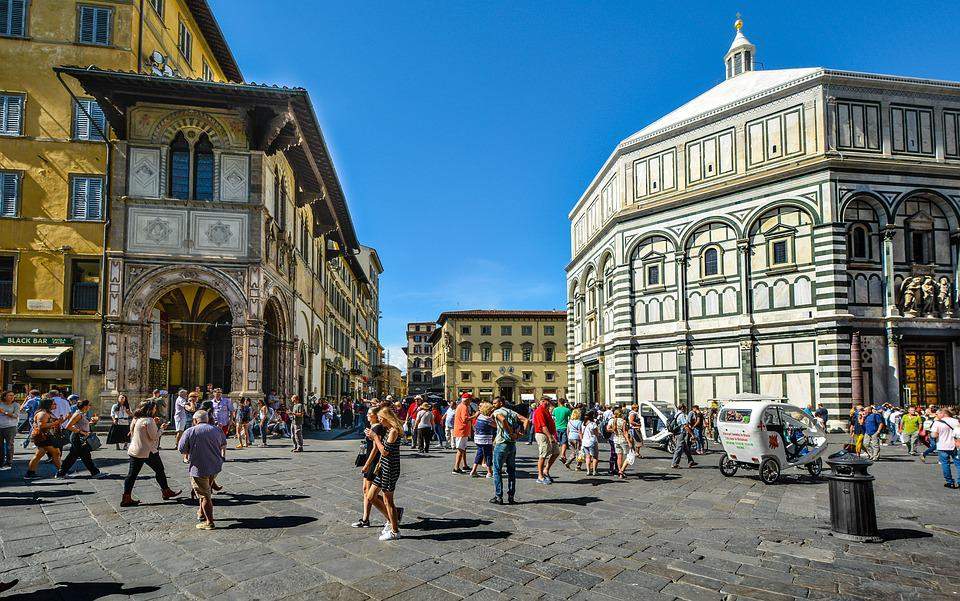Florence, considering introduction of tourists' donations to be given to the city
After the Municipality of Venice, the Municipality of Florence is also running for cover, looking for a system that can allow a virtuous coexistence between theneed for livability of a city of 358,000 inhabitants and the millions of tourists who visit it every year. In the last year before the pandemic, 2019, Florence recorded 4,025,355 arrivals and 11,048,718 overnight stays in official accommodations (tourists staying in apartments rented through widespread web portals are therefore excluded from this count), according to data provided to us by CST Center for Tourism Studies. And while lagoon mayor Brugnaro announces for next year the entry into force of a quota system of entrances regulated through a computer system, the first citizen of Florence Dario Nardella launched, in an interview with QN La Nazione, the idea of introducing a donation system for tourists who come to visit Florence so that they can contribute to the maintenance of the expenses of a city that is an open-air museum. It will not be a compulsory “obolus” but only voluntary, and will be in addition to the tourist tax already provided for those staying in the municipality and the entrance fee for tourist buses entering the city. For the municipality, the cost of ensuring decorum, security and lighting in the UNESCO area is around 50 million a year, the mayor explained.
The mechanism and the related IT platform will be presented in November, right in Florence, at the celebrations for the 50th anniversary of the establishment of the Unesco areas in front of ministers of culture and delegations from all over the world.
“I start from a basic concept,” Nardella says, “beauty has a value and it has a cost, and the tourist tax is only a partial measure. So for our city I have thought of a form of payment that we could call World Heritage Pass, precisely in the name of preserving our historical and cultural heritage recognized by UNESCO. Thanks to new technologies and taking advantage of digital platforms we will introduce a system of payment for services that provides voluntary ways of donation for the preservation of the historic center.”

As one enters an open-air museum (this is the mayor’s reasoning), “it must become natural to offer a contribution aimed at its preservation, with the aim of avoiding that the city’s upkeep falls only on residents and those staying in hotels.”
The system being studied should provide for a pop-up message to appear on tourists’ cell phones when they arrive in the city, a notice like when arriving in a foreign country, with a greeting welcoming them: “Welcome to the historic center of Florence, a world heritage site. Make a donation for its preservation” in a dozen languages.
Now the idea is in a gestatorial phase that will serve to refine the technological system to allow payment, we talk about the cost of a coffee a day, and also what to give back to thank and incentivize the tourist who wants to make the donation, such as useful information in real time, concessions for some services, precedence in entering some museums.
“Today,” the mayor notes, “whoever has the data wins. Through this platform we will be able to have a large amount of the data and information on how tourists move, their age, their preferences. which will allow us on the one hand to control tourist flows avoiding crowding phenomena in certain periods or times, and on the other hand to establish a relationship with them. To interact, to dialogue, because we believe digital communities are the new frontier for governing tourism in areas such as historic centers.”
On the future of art cities and their coexistence with tourism Florence and Venice also signed a decalogue for the “rebirth of art cities” that was sent to the government last year to set up a new model for the development of tourism in these realities.
The two mayors called, for example, for national legislation on short tourist rentals, which in recent years has generated a high-impact phenomenon for historic centers, emptying them of residents leaving their homes to rent to tourists. The problem of tourists staying in the city but escaping official statistics and the tourist tax is an economic problem of lower revenue but also a logistical problem that prevents local administrators from setting and calibrating the right city services policies without knowing the real number of people entering and using the city. Other demands include one on commerce to return the powers to regulate it to the mayors of these cities to solve a problem of the identity of the streets around the most visited tourist destinations, which, after liberalization in 2011, now sees a proliferation of franchise or large chain stores, standardizing the streets of many Italian cities.
 |
| Florence, considering introduction of tourists' donations to be given to the city |
Warning: the translation into English of the original Italian article was created using automatic tools. We undertake to review all articles, but we do not guarantee the total absence of inaccuracies in the translation due to the program. You can find the original by clicking on the ITA button. If you find any mistake,please contact us.




























